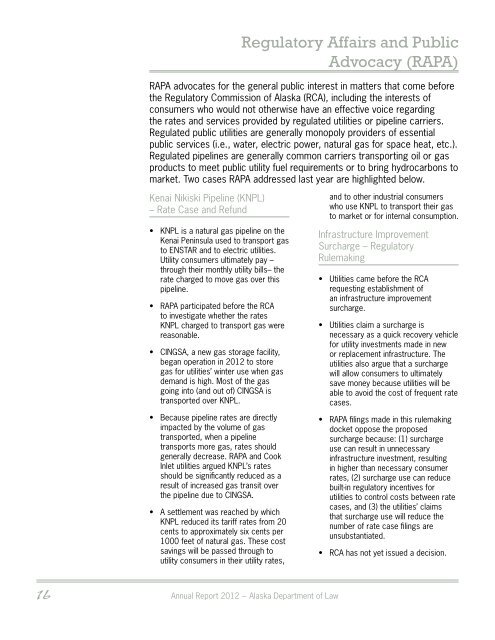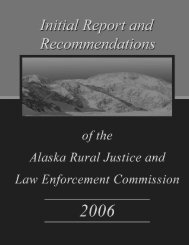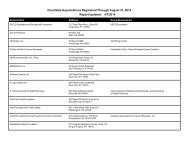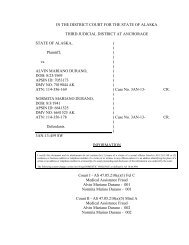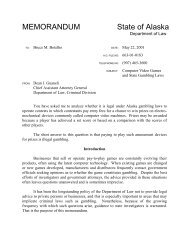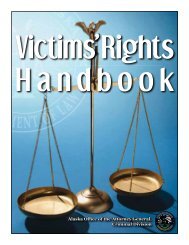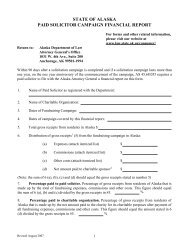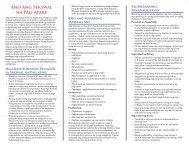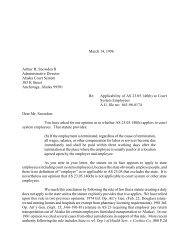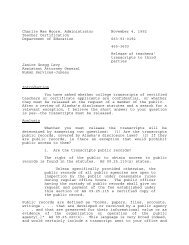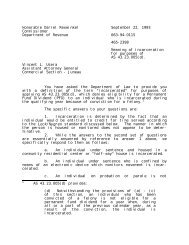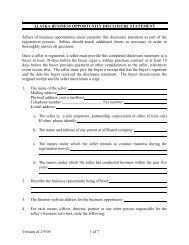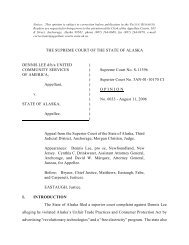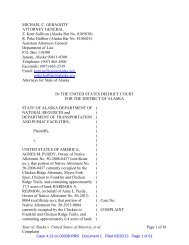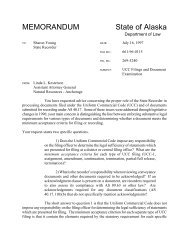Annual Report 2012 - Alaska Department of Law
Annual Report 2012 - Alaska Department of Law
Annual Report 2012 - Alaska Department of Law
Create successful ePaper yourself
Turn your PDF publications into a flip-book with our unique Google optimized e-Paper software.
Regulatory Affairs and Public<br />
Advocacy (RAPA)<br />
RAPA advocates for the general public interest in matters that come before<br />
the Regulatory Commission <strong>of</strong> <strong>Alaska</strong> (RCA), including the interests <strong>of</strong><br />
consumers who would not otherwise have an effective voice regarding<br />
the rates and services provided by regulated utilities or pipeline carriers.<br />
Regulated public utilities are generally monopoly providers <strong>of</strong> essential<br />
public services (i.e., water, electric power, natural gas for space heat, etc.).<br />
Regulated pipelines are generally common carriers transporting oil or gas<br />
products to meet public utility fuel requirements or to bring hydrocarbons to<br />
market. Two cases RAPA addressed last year are highlighted below.<br />
Kenai Nikiski Pipeline (KNPL)<br />
– Rate Case and Refund<br />
• KNPL is a natural gas pipeline on the<br />
Kenai Peninsula used to transport gas<br />
to ENSTAR and to electric utilities.<br />
Utility consumers ultimately pay –<br />
through their monthly utility bills– the<br />
rate charged to move gas over this<br />
pipeline.<br />
• RAPA participated before the RCA<br />
to investigate whether the rates<br />
KNPL charged to transport gas were<br />
reasonable.<br />
• CINGSA, a new gas storage facility,<br />
began operation in <strong>2012</strong> to store<br />
gas for utilities’ winter use when gas<br />
demand is high. Most <strong>of</strong> the gas<br />
going into (and out <strong>of</strong>) CINGSA is<br />
transported over KNPL.<br />
• Because pipeline rates are directly<br />
impacted by the volume <strong>of</strong> gas<br />
transported, when a pipeline<br />
transports more gas, rates should<br />
generally decrease. RAPA and Cook<br />
Inlet utilities argued KNPL’s rates<br />
should be significantly reduced as a<br />
result <strong>of</strong> increased gas transit over<br />
the pipeline due to CINGSA.<br />
• A settlement was reached by which<br />
KNPL reduced its tariff rates from 20<br />
cents to approximately six cents per<br />
1000 feet <strong>of</strong> natural gas. These cost<br />
savings will be passed through to<br />
utility consumers in their utility rates,<br />
and to other industrial consumers<br />
who use KNPL to transport their gas<br />
to market or for internal consumption.<br />
Infrastructure Improvement<br />
Surcharge – Regulatory<br />
Rulemaking<br />
• Utilities came before the RCA<br />
requesting establishment <strong>of</strong><br />
an infrastructure improvement<br />
surcharge.<br />
• Utilities claim a surcharge is<br />
necessary as a quick recovery vehicle<br />
for utility investments made in new<br />
or replacement infrastructure. The<br />
utilities also argue that a surcharge<br />
will allow consumers to ultimately<br />
save money because utilities will be<br />
able to avoid the cost <strong>of</strong> frequent rate<br />
cases.<br />
• RAPA filings made in this rulemaking<br />
docket oppose the proposed<br />
surcharge because: (1) surcharge<br />
use can result in unnecessary<br />
infrastructure investment, resulting<br />
in higher than necessary consumer<br />
rates, (2) surcharge use can reduce<br />
built-in regulatory incentives for<br />
utilities to control costs between rate<br />
cases, and (3) the utilities’ claims<br />
that surcharge use will reduce the<br />
number <strong>of</strong> rate case filings are<br />
unsubstantiated.<br />
• RCA has not yet issued a decision.<br />
16 <strong>Annual</strong> <strong>Report</strong> <strong>2012</strong> ~ <strong>Alaska</strong> <strong>Department</strong> <strong>of</strong> <strong>Law</strong>


